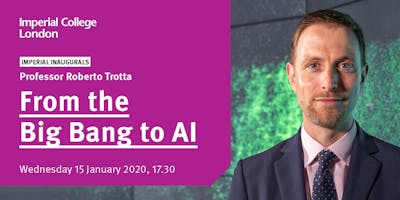You must login before you can post a comment.
- 🍻
From the Big Bang to AI
Science & Technology
The lecture is free to attend and open to all, but registration is required in advance.
A drinks reception will follow in the level 1 foyer of Blackett Building.
Abstract
At the beginning of last century, the Nobel Prize Winning physicist Ernest Rutherford reportedly believed that "If your experiment needs statistics, you ought to have done a better experiment". And yet today, advanced astrostatistical methods belong to the toolbox of every cosmologist, and Artificial Intelligence (AI) is poised to change how we look at the Universe.
Such tools are increasingly valuable as the emerging picture of the cosmos becomes ever more puzzling: dark matter and dark energy account together for 95% of content of the Universe -- yet little is known of either. Shedding light on these mysteries requires combining large, complex data sets from space observatories, particle accelerators, underground detectors and giant telescopes. However, understanding the reams of data produced will only be possible thanks to computational and statistical methods yet to be invented.
Roberto Trotta is a Professor of Astrostatistics at Imperial College London, who seeks to further our understanding of the universe by developing new methods to analyse and make sense of large cosmological data. In his inaugural lecture he will explore how astrostatistics will meet the challenges posed by big data to help answer fundamental questions of the cosmos: what is the Universe made of? How did it begin? What will its ultimate destiny be? As an innovative science communicator, he will also discuss his commitment to engaging the public with his work, especially on fundamental questions that might at first appear far removed from more pressing everyday concerns. This includes efforts to create multi-sensorial immersive experiences that encapsulate difficult concepts in cosmology by speaking to our hearts as well as our minds.
Biography
Roberto Trotta is Professor of Astrostatistics at Imperial College London, where he is also the Director of the Centre for Languages, Culture and Communication, responsible for delivering humanities and languages education to over 4500 students at Imperial. His research in cosmology aims at elucidating the nature of dark matter and dark energy in the cosmos, which together account for 95% of the contents of the universe. He is also a Visiting Professor of Cosmology at Gresham College, London.
He was born and grew up in the Italian speaking part of Switzerland. After obtaining an MSc(Hons) in Physics from ETH Zurich and a PhD in Theoretical Physics from the University of Geneva, he was the Sir Norman Lockyer Fellow of the Royal Astronomical Society at Oxford University, and a Junior Fellow of St Anne’s College, before being appointed at Imperial in 2008.
Professor Trotta is an experienced science communicator, who develops novel ways of making abstract concepts in cosmology more tangible for the public at large, and seeks to make astronomy communication more inclusive. He has collaborated with chefs and human-machine interaction experts to design immersive experiences that convey cosmological ideas in a multi- sensory fashion. He is the recipient of numerous awards for his research, teaching and public engagement activities, including the Lord Kelvin Award of the British Association for the Advancement of Science, the Michelson Prize of Case Western Reserve University, the Chair George Lemaitre of the University of Louvain and two President's Awards for Excellence at Imperial College London. His award-winning first book for the public, ‘The Edge of the Sky’ explains the Universe using only the most common 1,000 words in English, for which he was named one of the 100 Global Thinkers 2014 by Foreign Policy magazine. Outside of Imperial, Professor Trotta is a Director and co-founder of Data Fusion Consultants, offering data analytical solutions derived from his research.
Please note that Imperial College London processes your personal data in line with the Advancement Privacy Notice. If you have any questions or concerns about this, please contact [email protected]




